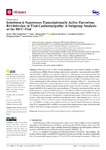2022-02-21Zeitschriftenartikel
Interferon-β Suppresses Transcriptionally Active Parvovirus B19 Infection in Viral Cardiomyopathy: A Subgroup Analysis of the BICC-Trial
Schultheiss, Heinz-Peter
Bock, Claus-Thomas
Aleshcheva, Ganna
Baumeier, Christian
Poller, Wolfgang
Escher, Felicitas
Human parvovirus B19 (B19V) is the predominant virus currently detected in endomyocardial biopsies (EMBs). Recent findings indicate that, specifically, transcriptionally active B19V with detectable viral RNA is of prognostic relevance in inflammatory viral cardiomyopathy. We aimed to evaluate B19V replicative status (viral RNA) and beneficial effects in a sub-collective of the prospective randomized placebo-controlled phase II multi-center BICC-Trial (Betaferon In Chronic Viral Cardiomyopathy) after interferon beta-1b (IFN-β) treatment. EMBs of n = 64 patients with B19V mono-infected tissue were retrospectively analyzed. Viral RNA could be detected in n = 18/64 (28.1%) of B19V DNA positive samples (mean age 51.7 years, 12 male), of whom n = 13 had been treated with IFN-ß. Five patients had received placebo. PCR analysis confirmed in follow-up that EMBs significantly reduced viral RNA loads in n = 11/13 (84.6%) of IFN-ß treated patients (p = 0.001), independently from the IFN-ß dose, in contrast to the placebo group, where viral RNA load was not affected or even increased. Consequently, a significant improvement of left ventricular ejection fraction (LVEF) after treatment with IFN-ß was observed (LVEF mean baseline 51.6 ± 14.1% vs. follow-up 61.0 ± 17.5%, p = 0.03). In contrast, in the placebo group, worsening of LVEF was evaluated in n = 4/5 (80.0%) of patients. We could show for the first-time the beneficial effects from treatment with IFN-ß, suppressing B19V viral RNA and improving the hemodynamic course. Our results need further verification in a larger prospective randomized controlled trial.
Files in this item

